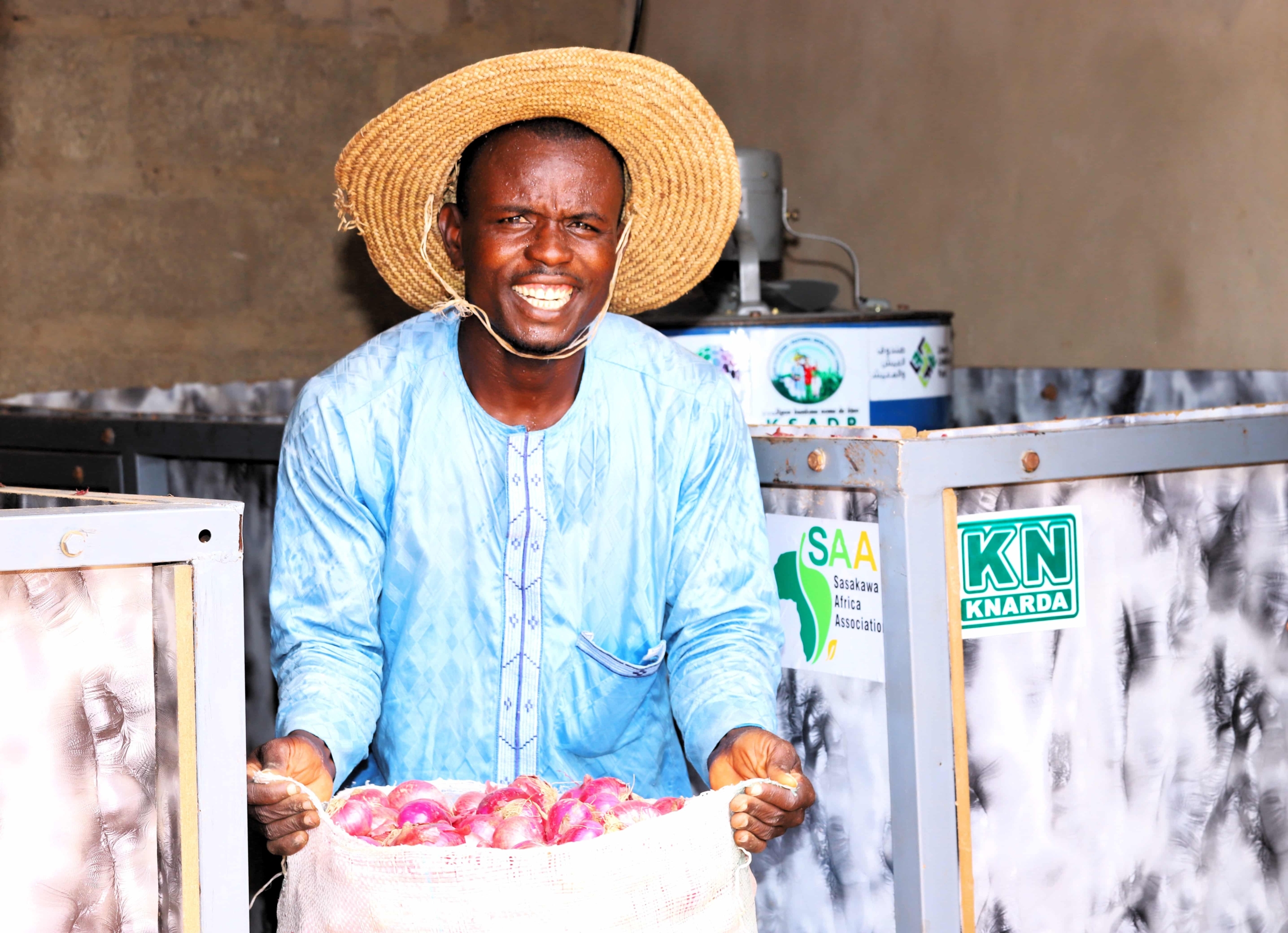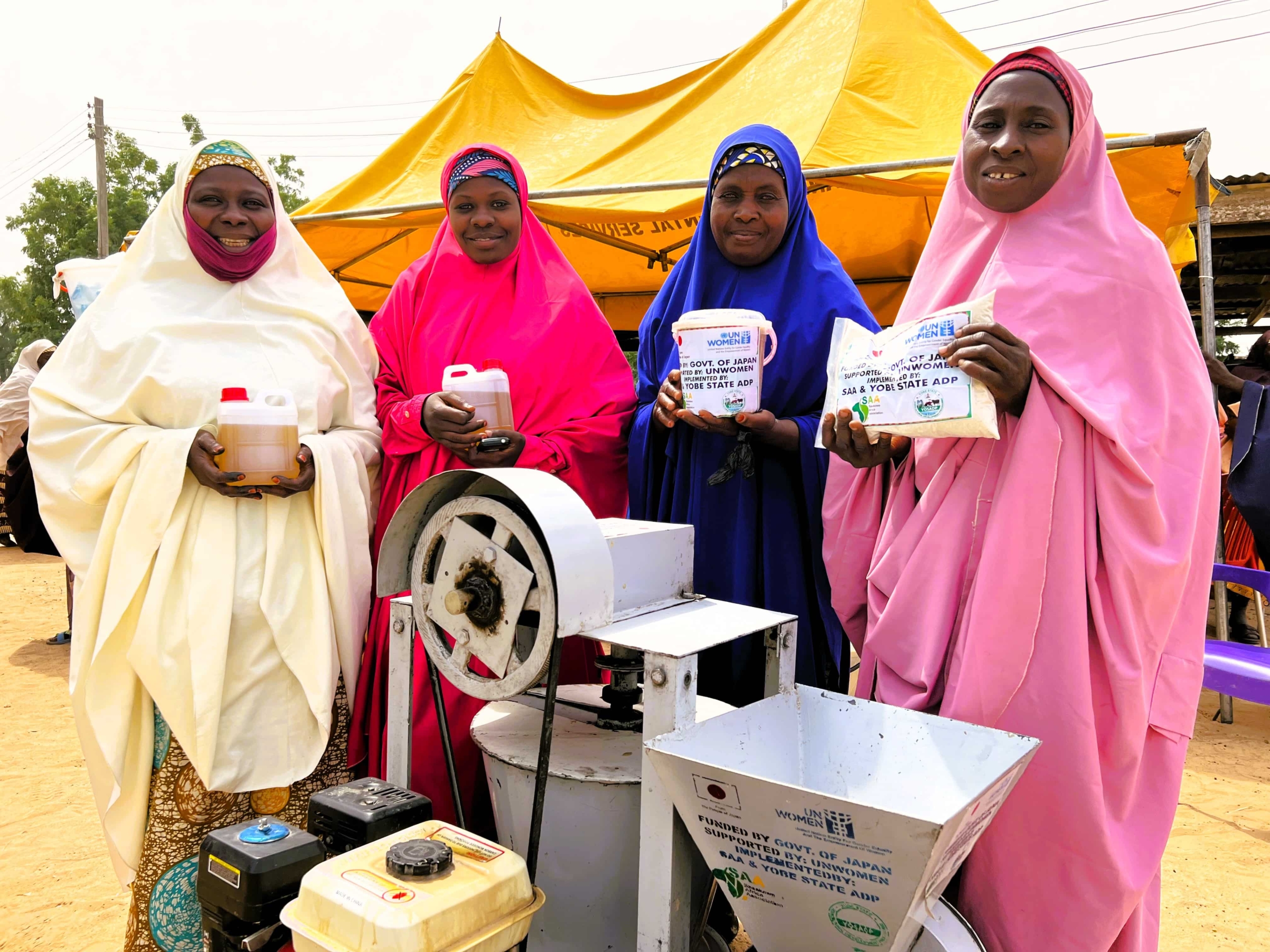
Transforming Nutrition Practices Among Smallholder Farmers in Africa
This year, 26.5 million Nigerians — more than 13% of the most populous country in Africa — are expected to grapple with high levels of food insecurity. In a nation where 37% of the population lives below the poverty line, this urgent problem faces people in every corner of the country, including smallholder farmers. Recognizing the unique nutritional challenges faced by smallholder farmers and their households, the Sasakawa Africa Association (SAA) has long been at the forefront of changing the way African farmers think about nutrition.
Through Impacting Gender and Nutrition through Innovative Technical Exchange in Agriculture (IGNITE) — a technical assistance mechanism implemented by Tanager, 60 Decibels, and Laterite that supports African institutions’ ability to integrate gender and nutrition into their agricultural interventions and their way of doing business — SAA launched an initiative in 2021 aimed at transforming nutrition practices among smallholder farmers and their households. Tanager gender and nutrition experts developed content and trained SAA’s staff, known as Nutrition Champions (NCs), on social and behavior change (SBC) and nutrition best practices. The NCs in turn, trained extension workers on nutrition messaging in SAA’s farming communities in Ethiopia, Mali, Nigeria, and Uganda. The nutrition messaging provided an overview of human nutrition, including food groups, diverse diets, and collaborative gender involvement.
On behalf of IGNITE, 60 Decibels then conducted three studies to understand the effectiveness of the nutrition training — and any changes related to knowledge, attitudes, and practices on nutrition and gender roles — among the SAA farming communities.
This collaboration between IGNITE and SAA marked a significant stride toward not only enhancing nutritional awareness but also embedding sustainable consumption practices among smallholder farmers.

Evaluating Success: Insights from 60dB’s Comprehensive Assessment
In the third and final study of SAA’s program, 60 Decibels interviewed 263 farmers in Nigeria (including 105 female farmers) to assess the impact of SAA’s SBC campaign. Approximately 60% of the survey was drawn from the baseline study; the remaining were new respondents. The findings were telling: Farmers demonstrated a marked improvement in their understanding of malnutrition, its causes, and its prevention. Three findings stood out: first, SAA’s programing led to a clear boost in malnutrition awareness, second, farmers struggled to incorporate macro and micronutrients due to their high price, and third, curriculum creators must be aware of cultural nuances when urging women to utilize SAA’s education.
Enhanced Awareness Through Targeted Training
SAA’s campaign to promote improved nutrition practices among smallholder farmers has markedly improved awareness about the critical issue of malnutrition:
● Awareness leap: Post-training, most farmers were aware of malnutrition, its drivers, and symptoms. The majority of farmers described malnutrition both in terms of its underlying causes (87%), as well as its symptoms (71%).
● Holistic understanding: Farmers now recognize malnutrition as a multifaceted issue, moving beyond the simplistic view of it being merely about insufficient food to include other factors like dietary diversity and food quality. The percentage of farmers reporting that ‘eating only one type of food’ causes malnutrition jumped from 36% in the baseline survey to 62% in the follow-up survey.
● Community perception: The majority of farmers (3 in 4) now view malnutrition as a serious community problem, primarily attributing it to inadequate food availability. This heightened awareness is also reflective of the training’s focus on the vulnerability of specific groups, particularly children under five.
Enhanced awareness can be attributed to the well-designed training content, which was refined using insights from the baseline survey. SAA used post-training evaluations to tailor the training content, focusing on critical areas of knowledge deficit. Through innovative methods like quizzes and evaluation tables, SAA ensured that the trainings were not just informative, but also engaging, leading to a measurable increase in knowledge retention among farmers.
The Importance of Macro and Micronutrients: Challenges and Solutions
Addressing the nutritional needs of smallholder farmers involves overcoming significant barriers to accessing and incorporating a balanced diet:
● Economic constraints: The primary challenge remains the high cost of nutrient-rich ingredients, despite increased awareness of the importance of macro and micronutrients. For farmers that reported preparing protein-rich meals was difficult (41%), almost all of them cited the price point as the largest hindrance for adoption.
● Local solutions: To combat these challenges, communities have been encouraged to grow fruits and vegetables locally, which helps in reducing the economic burden and promotes the consumption of fresh, nutrient-rich produce.
The economic constraints faced by farmers, exacerbated by Nigeria’s challenging economic environment, make it difficult to maintain a balanced diet rich in essential nutrients. However, SAA’s programming has spurred farmers to explore local sources of nutrients and to cultivate fruits and vegetables, thereby mitigating some of the economic barriers to a nutritious diet.
Navigating Gender Dynamics in Nutritional Decisions
This final 60dB survey has also brought to light the nuanced gender dynamics affecting nutrition decisions within households:
● Decision-making: More than 60% of households still see men as the primary decision-makers regarding food, largely due to their roles as household heads or main income earners.
● Involvement in meal planning and preparation: While meal planning involves both genders, meal preparation is still predominantly performed by women, despite men’s significant influence on food decisions.
● No clear change in female participation: Women who are already the main decision-makers are more likely to report ‘very much increased’ input into food decisions over the past year, compared to women who are not the main decision-makers (53% vs. 23%). For men, change in the level of input is unaffected by who the main decision-maker is or their sex.
The study also shed light on nuanced gender dynamics within households, revealing that while male decision-makers predominantly influence food-related decisions, there has been a positive shift toward more inclusive decision-making. SAA has begun to subtly change perceptions around gender roles by identifying and empowering Gender Champions. These Gender Champions are influential community members identified by SAA to advocate for balanced decision-making at the household level. By working to respect cultural and religious norms, SAA is emphasizing the economic and health benefits of empowering women in nutritional decisions.

Conclusion: A Step Forward, With More Ground to Cover
The insights gained from the survey highlight both the achievements around raising awareness, improving knowledge, and beginning the initiation of behavior change toward better nutrition and gender dynamics. However, the challenge that lies ahead is to actually see a larger proportion of farmers change their diets. Continuing to refine and adapt strategies to meet the evolving needs of smallholder farmers will be crucial in ensuring the sustainability and expansion of these vital nutritional improvements.